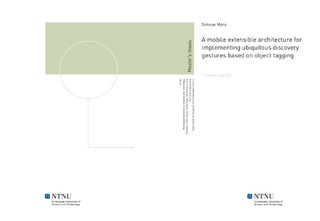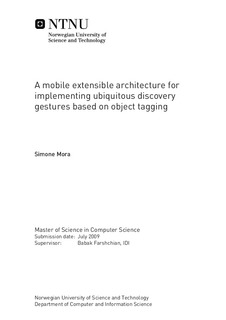| dc.contributor.advisor | Farshchian, Babak | nb_NO |
| dc.contributor.author | Mora, Simone | nb_NO |
| dc.date.accessioned | 2014-12-19T13:32:38Z | |
| dc.date.available | 2014-12-19T13:32:38Z | |
| dc.date.created | 2010-09-03 | nb_NO |
| dc.date.issued | 2009 | nb_NO |
| dc.identifier | 347871 | nb_NO |
| dc.identifier | ntnudaim:4694 | nb_NO |
| dc.identifier.uri | http://hdl.handle.net/11250/250788 | |
| dc.description.abstract | Mobility of people and their interactions with devices and services that every day become more pervasive in our life is a valuable challenge for system engineers. Locate friends, retrieve multimedia informations from physicals objects, have medical assistance remotely is going to be a commodity for a more and more wide part of the population, including elderly people. In this scenario have an easy way for discovering and communicating with third party services and resources that we encounter in our every day life is going to make the difference between an enjoyable user experience or a frustrating ones that quickly leads to the abandon of a system. Building on the work done in the past about resources discovery and management I study a solution for user-centered interactions with resources and services dynamically discovered and used by the user in nomadic environments. The solution designed make use of embedded devices, addressing the problem encountered in the research from both end-user and developer point of views. The solution proposal make a full use of the service oriented architecture (SOA) concepts focusing on the goal of achieving the most natural human interaction with devices that the user discover on his way, keeping at the same time the framework architecture lightweight and easily extendible by third-party developers, as the SOA paradigm requires. Accessibility and extensibility are achieved on the end-user side by deploying software needed for the personal device (UbiNode) on most common smartphones and providing a easily understable Graphical User Interface; on the developer side by creating a pluggable framework based on xml and Eclipse eRCP runtimes for a fast development of multiple user interface that fits the constrains of the device in which are them deployed in. Work done consists in design and implementation of several platform components and development of prototypes that takes profit from the overall architecture. Developed modules have been deployed end tested on handled devices. UbiCollab provides a solution platform for ubiquitous collaboration scenarios and this thesis has been carried out as a contribution to it. Keywords: Ubiquitous Computing, User Centered collaboration, User Interfaces, Mobile Devices, Discovery Gestures, Object Tagging, UbiCollab. | nb_NO |
| dc.language | eng | nb_NO |
| dc.publisher | Institutt for datateknikk og informasjonsvitenskap | nb_NO |
| dc.subject | ntnudaim | no_NO |
| dc.subject | SIF2 datateknikk | no_NO |
| dc.subject | Program- og informasjonssystemer | no_NO |
| dc.title | A mobile extensible architecture for implementing ubiquitous discovery gestures based on object tagging | nb_NO |
| dc.type | Master thesis | nb_NO |
| dc.source.pagenumber | 127 | nb_NO |
| dc.contributor.department | Norges teknisk-naturvitenskapelige universitet, Fakultet for informasjonsteknologi, matematikk og elektroteknikk, Institutt for datateknikk og informasjonsvitenskap | nb_NO |

